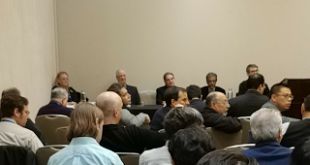Is capitalism still creating prosperity and well-being for the many? That’s a central question behind Re-Imagining Capitalism (Oxford University Press, November 2016), a book coedited by McKinsey’s global managing partner, Dominic Barton; York University’s Schulich School of Business dean, Dr. Dezsö J. Horváth; and Matthias Kipping, Richard E. Waugh chair of business history at the Schulich School. In this video interview, Horváth speaks with McKinsey’s Rik Kirkland about the various forms...
Read More »Ease up on shareholder payouts, pay your workers more instead
With Alberta and Ontario raising their minimum wage to $15 per hour, and BC possibly following suit soon, the usual suspects have begun their predictable howling about how this is a bad time, or it’s happening too fast, or how it will simply hurt those we are trying to help. It is true that increasing the minimum wage may result in slightly fewer jobs for teenagers, and slightly fewer hours for other workers – but the evidence shows that overall the effect is positive, especially for low...
Read More »Capitalism is national & transnational, but what about the money?
This is my short response, originally posted here, to William I. Robinson's post here and Fred Magdoff's note in the comment section of that post:While I generally agree with Robinson's and Magdoff's analyses, what is absent, specifically with respect to Robinson's discussion, is a concrete assessment of the acute variables that measure the degree to which national States have the capacity to engage in power-maximizing behavior and, thus, pursue certain responses, i.e. imperialism, to the...
Read More »How Capitalism is Killing Itself
[embedded content] Short documentary on the limits of capitalism mostly based on an interview by Richard Wolf. I find the simplistic explanation of exploitation at the end (around minute 27:30) based on the time of work (prices proportional to labor incorporated) to be problematic (for a discussion of the Labor Theory of Value, LTV go here). At any rate, worth watching whether you agree with Wolf's interpretation of Marx and capitalism or not.
Read More »Can Capitalists Afford a Trumped Recovery? Guest post by Jonathan Nitzan & Shimshon Bichler
Your access to this site has been limited Your access to this service has been temporarily limited. Please try again in a few minutes. (HTTP response code 503) Reason: Exceeded the maximum number of page requests per minute for humans. Important note for site admins: If you are the administrator of this website note that your access has been limited because you broke one of the Wordfence blocking rules. The reason your access was limited is: "Exceeded the maximum number of page requests per...
Read More »The Nature of Capitalism and Secular Stagnation
McCloskey, Lazonick, Despin, and Shaikh (I'm covered) The joint AEA/URPE session was very lively, but suffered from the last minute absence of Brad DeLong. He did send the notes of what he was going to discuss here. On the topic of stagnation per se only Hans Despin suggested that it was an important phenomenon, but not necessarily for the same reasons Larry Summers and Brad De Long. It was unclear to me, however, that his views were based on a demand side story, and, hence, that this...
Read More »DisORIENT
Marginalist ReOrientation Slow posting for a while. Too many things happening that I didn't comment on, but I'll try to weigh in on the paper by Paul Romer on the trouble with macro. At any rate, the paper DisORIENT: Money, Technological Change and the Rise of the West has been published.
Read More »Big Think and the nature of capitalism
Jack Goody was one of those rare thinkers that tried to think big. Not common in economics anymore, and less clear in other social sciences, as somewhat narrowly defined techniques take over the breadth of historical understanding. I've only read before his The Theft of History, somewhat iconoclastic book in which he debunks the idea that individualism, democracy and freedom were somehow invented by modern Western society.I started reading now his Metals, Culture and Capitalism. There are...
Read More »Marx on the Increasing Intensity of Labour in Industrial Capitalism: I Refute Him Thus
In the videos below.But first let us look at Marx’s theory. It is that capitalists aim at increasing their theft of surplus value from workers.They can do this in three ways: (1) by increasing the length of the working day while holding down the real wage to a subsistence level (that is, increasing absolute surplus value);(2) decreasing the price of the basic commodities making up the value of the maintenance and reproduction of labour by automation, and thus reducing the real subsistence...
Read More »Paul Bairoch on the Industrial Revolution, Imperialism and Capitalism
The economic historian Paul Bairoch (1930–1999) subjected some Marxist myths about Western capitalism and imperialism to critical scrutiny in his now classic book Economics and World History: Myths and Paradoxes (New York and London, 1993).First, was the Western industrial revolution dependent on energy from the Third World?Bairoch (1993: 59) notes that right up until the post-WWII era the West was almost completely self-sufficient in energy, and as late as the 1930s much of the developed...
Read More » Heterodox
Heterodox



